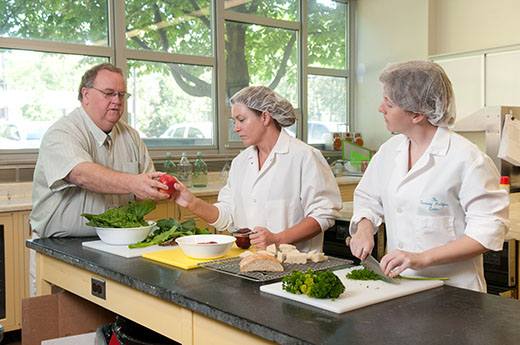Research center helps consumers 'fight bac' through national poultry food safety campaign
Monday, May 8, 2017

Edgar Chambers IV, co-director of Kansas State University's Center for Sensory Analysis and Consumer Behavior, works with center researchers to study safe food handling practices. The Partnership for Food Safety Education is using center research as the basis for a nationwide food safety campaign.
MANHATTAN — Kansas State University research is reaching kitchens and grocery stores across the country, thanks to a national campaign that promotes food safety and safe poultry handling.
The Partnership for Food Safety Education is using research from Kansas State University's Center for Sensory Analysis and Consumer Behavior for its nationwide campaign, Don't Wing It: Practice Safe Poultry Handling. The campaign is being featured by Wal-Mart, Publix and other supermarkets across the country.
University researchers conducted years of food safety studies and developed safety tips that are the basis of the campaign. These food safety tips and information will appear in grocery store signs, circular ads, poultry bags, cooler shelf tags, propane tanks and other locations throughout stores.
"Research on food safety conducted in the Center for Sensory Analysis and Consumer Behavior is key to our overall goal of ensuring that consumers get the best products and information to help them live healthy, happy, productive lives," said Edgar Chambers IV, co-director of the center and university distinguished professor of food, nutrition, dietetics and health. "The fact that a national group like the Partnership for Food Safety Education chose to use the research that we conducted as the basis of their new national campaign shows the importance of what we do."
Researchers involved at Kansas State University include Dolores Chambers, co-director of the Center for Sensory Analysis and Consumer Behavior and professor of food, nutrition, dietetics and health; Kadri Koppel, assistant professor of food, nutrition, dietetics and health; Curtis Maughan, 2015 doctoral graduate in human nutrition; and Amy Donelan, 2016 master's graduate in human nutrition.
K-State Olathe is conducting research for an upcoming second phase of the study, which looks at grilling and food safety. Researchers involved in this phase include Marianne Swaney-Stueve, research assistant professor in the department of food, nutrition, dietetics and health, and manager of the Sensory and Consumer Research Center at K-State Olathe; Tegan Jepsen, program analyst for the center; and Taylor Terry, master's student in human nutrition, Memphis, Tennessee.
The U.S. Department of Agriculture's National Institute of Food and Agriculture funded the research, which also included collaborating institutions Tennessee State University and RTI International.
"This is sensory science in action," Chambers said. "We conducted surveys, watched consumers in grocery stores as they shopped and watched as they stored food in homes. We also observed their cooking and cooking behavior and conducted many other food safety-focused studies."
Chambers noted that simple steps could help consumers keep poultry and meat safer. Some of the safety tips based on Kansas State University research include:
• Disinfecting shopping cart handles. University studies showed that 85 percent of people touch shopping cart handles after handling raw poultry and 49 percent of people had poultry juice on their hands when they touched the handles.
• Using meat bags in grocery stores and keeping meat in bags until getting home.
• Washing hands before and after food preparation. A university study demonstrated that 90 percent of consumers cross-contaminated food during meal preparation.
• Checking doneness of meat and poultry with a meat thermometer. A university study of consumers nationwide demonstrated that only 57 percent of consumers use a thermometer for whole chickens and 12-26 percent use it for smaller pieces. Similarly, university studies show that LED kitchen lighting caused 50 percent of consumers to view poultry as done when it was not.
The university team will continue adding important research to the campaign in the next year, Chambers said. This will include findings from K-State Olathe.
The Partnership for Food Safety Education is a nonprofit organization that delivers science-based messaging to consumers to reduce risk of foodborne illness.